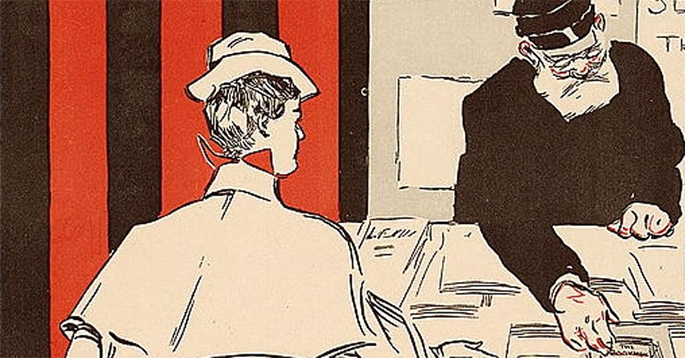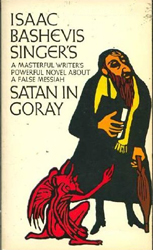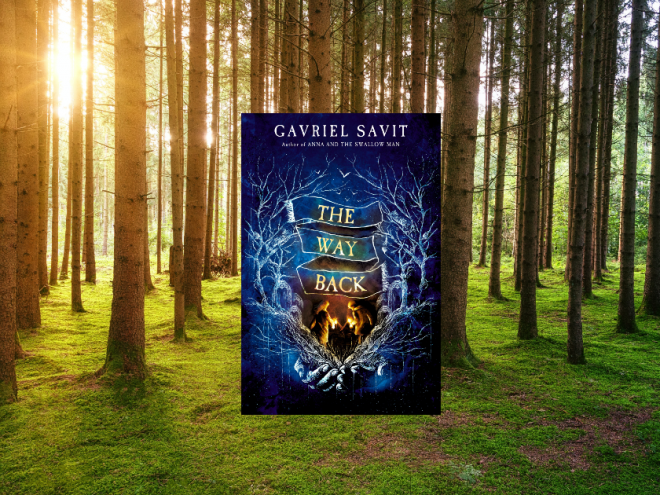Gavriel Savit is an author and actor whose work in both fields has taken him on travels across the world. With the release of his debut novel, Anna and the Swallow Man, this week he joins the Visiting Scribe series as a guest contributor to The ProsenPeople.

“And He said, ‘You will not be able to see my face, for the human will not see me and live.’” (Exodus 33:20)
“Studying a face:
Stepping back to look at a face
leaves a little space
in the way
like a window.
But to see—
It’s the only way to see.” (Stephen Sondheim, Sunday in the Park with George)“I can take any empty space and call it a bare stage.” (Peter Brook, The Empty Space)
I had the most peculiar experience the other day.
I was down in Texas with my fiancée for about half a week, in loose conjunction with a language conference there. We mostly used the trip as an excuse for the consumption of smoked meat, local beer, and lovely, idle conversation. We were traveling, though, and — from my perspective at least — certain rituals are absolutely nonnegotiable when traveling. Primary among these is the local bookshop visit.
Any bookshop is a haven to me — like a consulate or embassy, away from home — but my favorite sort to visit while traveling is the second-hand; they manage to be familiar and comforting (the smell of aging bindings is a heady thing) while providing a unique view of the location in which they’re situated. The books people choose to resell, the books people had in the first place — these are each of them clues toward the eventual grokking of a local culture.
And so we stumbled into a lovely little local Texas bookstore. My fiancée and I split off and went about the business of visiting our old friends.
In general, I like to start off perusing the first editions and rare books in their plate-glass cabinets, smirking at the posters, flipping through the table displays, a little palate teaser before I make my way over to the real goals of my visit:
Folklore & Mythology (usually one or two things here to pique the interest); Magic and the Occult (more often than not consumed in wacky mid-seventies counterculture nonsense or twentieth-century self-published conspiracy theories, but on occasion with a serious, scholarly text in the mix); and finally, the crown jewel of any used bookstore — Judaica and Jewish Studies.
 Only in this bookstore, there was no such section.
Only in this bookstore, there was no such section.
Now, I know what you’re thinking: it must’ve been one of those alternatively organized places — you know, a shop that thinks it’s cute to start at the ultimate left hand side of their shelving and put everything down in order of its original publication, left to right, so you have no choice but to surreptitiously Google what the precise publication year of Isaac Bashevis Singer’s Satan in Goray was — or something like that.
But no. Their organization was totally standard. And in fact, here was Eastern Philosophy, here Buddhism, here Hinduism, here Christianity.
I was unsettled. I checked, thoroughly, on the end-caps, on the opposite side of each bookshelf, but it was true — there were simply no Jewish books in the bookshop.
This was bizarre. This was incomprehensible. This was like an uncanny dream of the childhood home in which nothing is familiar. Where there are Jews (and believe it or not, there are quite a few in Texas), there are Jewish books, and, with the magnetic attraction of the agnostically secular among us, drawn back to shul on Erev Yom Kippur, these Jewish books can be counted upon to find their way back to the second-hand bookstore.
Ultimately, there are several very good possible explanations for the lack of Jewish books in this individual bookshop. It could be that this particular corner of Texas lacked the critical mass of Jews necessary to support any real trade in second-hand Jewish books, or it could be possible that the Jews in this locality dispose of their unwanted books of Jewish interest to some local synagogue or day school library. There are plenty of reasonable, non-antisemitic reasons a bookstore would lack a Jewish books section.
But over the next several days, I found myself still thinking about it. As far away as Boston, Massachusetts, an absurd, unfair, peculiar thought kept dogging me: Why couldn’t they at least have left an empty shelf?
And after having come back to this question several times, I came to this conclusion:
An empty shelf in the Religion section might have turned this Texan bookstore from one of the least Jewish places I’ve ever encountered into one of the most.
This may be difficult to understand; over the next few days in this space, I’m going to try and expand what I mean by that, but in brief, let me explain like this:
This week I publish a book called Anna and the Swallow Man which is in some ways significantly and intentionally ambiguous. At the book’s end, the reader is left with certain fertile uncertainties that I hope will provoke a  particular kind of experience — something unstable, something speculative, something that allows the potential of all sorts of beautiful, contradictory, simultaneous possibilities that might otherwise have to have been discarded as irrational.
particular kind of experience — something unstable, something speculative, something that allows the potential of all sorts of beautiful, contradictory, simultaneous possibilities that might otherwise have to have been discarded as irrational.
For me, there’s a sort of profound mystical experience to be found in this uncertain space. Whether or not I managed to evoke it in my book is for readers to decide, but I will say this: that uneasy, magical space of uncertainty is central to my feelings about magic, religion, and art, which — you should pardon the expression — are a sort of holy trinity for me.
And that, I think, could scarcely be more Jewish.
Gavriel Savit is an actor and author from Ann Arbor, MI, and a graduate of the University of Michigan’s prestigious Musical Theatre program. He is the author of Anna and the Swallow Man (Knopf, 2016) and an emerging voice in Jewish literature.
Related Content:
- Sigal Samuel: Why the Scene I Cut from My Novel Is Actually Its Key
- Julie R. Enszer: The Act of Writing a Poem
- Rabbi Lawrence Hajioff: Jews and Their Many Questions
Gavriel Savit holds a BFA in musical theater from the University of Michigan in Ann Arbor, where he grew up. As an actor and singer, Gavriel has performed in three continents, from New York to Brussels to Tokyo. He is also the author of Anna and the Swallow Man, which The New York Times called “a splendid debut.”



